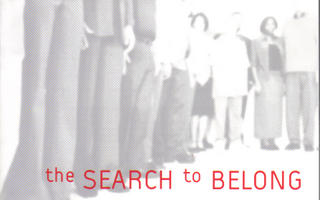The Search to Belong

Joseph R. Myers writes with great honesty on a subject that many people are struggling to understand.
Myths of Belonging (If I only had…..)
More time = more belonging
More commitment = more belonging
More purpose = more belonging
More personality = more belonging
More proximity = more belonging
More small groups = more belonging
Belong occurs when we
Connect ++++ Commit ++++ Participate ++++find our connection significant
4 SPACES of Belonging
Public Space - Public belonging occurs when people connect through an outside influence. Fans of a sports team experience a sense of community because they cheer for the same team. They wear official garb, buy special broadcast viewing privileges, and stay up too late or get up extra early just to see the results of the game. These relationships carry great significance in our lives
Social Space - Social belonging occurs when we share "snapshots" of what it would be like to be in personal spcae with us. The phrase "first impression" and "best foot forward" refer to this spatial belonging. You belong socially to your favorite bank teller, you pharmacist, or some of the people with whom you work. Social belonging is important for two reasons. First, it provides the space for "neighbor" relationships. A neighbor is someone you know well enough to ask for (or provide) small favors. Second, it is important because it provides a safe selection or sorting space" for those with whom you would like to develop a "deeper" relationship. We get just enough information to decide to keep this person in this space or move them to another space.
Personal Space - Through personal belonging, we share private (not naked) experiences, feelings, and thoughts. We call the people we connect to in this space "close friends." They are those who know more about us than an acquaintance would, yet not so much that they feel uncomfortable.
Intimate Space - In intimate belonging, we share "naked" experiences, feelings, and thoughts. We have very few relationships that are intimate. These people know the "naked truth" about us and the two of us are not "ashamed."
Important Reminders from Myers
People change spaces: Marriage, Divorce, moving, ect.
Belonging cannot measured by attendance
Having a deep longing to belong is normal and healthy
We can create space for belonging, but we cannot control or program an individuals choice to belong
